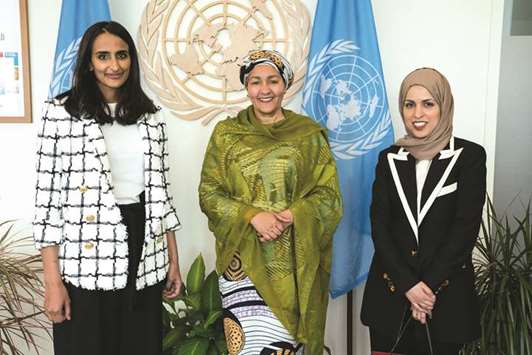In our increasingly interconnected world, students and educators are seeking more nuanced views of other people and cultures, and connections with their peers that offer a deeper and more meaningful understanding beyond news headlines and soundbites.
Learning a language and studying about another part of the world allows us to discover more about ourselves, and to have an improved working relationship with our peers both in person and virtually – essential educational outcomes for today’s secondary school graduates.
Enabling these outcomes is at the heart of the educational ecosystem that Qatar has built, and of the work of Qatar Foundation International (QFI). Established by Qatar Foundation (QF) to connect the world’s youth with the Arabic language, QFI provides a student-centred learning environment that fosters greater insight into the Arab world, through Arabic language courses and teaching students about the region’s societies and cultures.
We partner with primary and secondary schools, universities, multilateral entities, and other philanthropic organisations to ensure that our programmes advance students’ acquisition of global competency and 21st-century skills. We act on our belief that the world benefits from openly-available educational resources, particularly digital and in Arabic. And we actively engage our community of students, teachers, and administrators to facilitate connections, supporting them as they explore new ways of enriching the classroom learning experience. In this way, we nurture young people who possess broad worldviews, and whose minds are curious rather than closed – true global citizens.
The impact and value of this approach to education can be seen in our global community of learners and educators, and was once again exemplified at the recent United Nations Youth Dialogue conference, where six alumni of QF partner universities and QFI programmes further expanded their cross-cultural understanding when joining HE Sheikha Hind bint Hamad al-Thani, Vice-Chairperson and CEO of Qatar Foundation, at the United Nations headquarters in New York.
Among them was Mohamed bin Nasser al-Mohannadi, who has just started an internship at the United Nations Relief and Works Agency for Palestine Refugees in the Near East, and Tim Hursen, who is studying advanced Arabic as a graduate student at George Washington University in DC. Having first met when they were both in middle school, they are from different cultural backgrounds but have learned and benefited from each other. Meanwhile, two other alumni – Wai Chum, from Seattle, Washington, and Nora al-Jurdi, a graduate of Carnegie Mellon University in Qatar – highlighted how visits to each other’s schools and STEM-themed educational exchanges had shattered stereotypes about “the other”.
This is how barriers are broken down: through education, through exchange, through fostering understanding. These values are at the core of Qatar’s vision, and of how this vision has a positive message for, and positively impacts on, the wider world. One year on from the start of the unjust blockade of Qatar, it is an appropriate time to acknowledge the importance of these values that we hold – not merely in a national context, but a global one.
Through the leadership of His Highness the Amir Sheikh Tamim bin Hamad al-Thani, and under the guidance of His Highness the Father Amir Sheikh Hamad bin Khalifa al-Thani, along with the unwavering support of Her Highness Sheikha Moza bint Nasser and HE Sheikha Hind bint Hamad al-Thani, more children around the globe now have access to quality global education, and the opportunity to equip themselves with the tools that can transform their lives: collaboration, creativity, cross-cultural communication, and critical thinking.
Where the commitment of others to broadening understanding and fostering cross-cultural connectivity is reflected in words, Qatar’s commitment to doing so is reflected in deeds and the tangible impact of our programs on the communities we serve. It is reflected in Qatar National Library, QF’s outstanding partner universities and its homegrown Hamad Bin Khalifa University, and the global partnerships formed by Education Above All. And it is reflected by the fact that no other Arabic-speaking country has done what Qatar has to advance the teaching of Arabic, and knowledge of the Arab world, to young people in the US, the UK, Germany, and many other countries.
None of these achievements would have been possible without decades of commitment, hard work, and unceasing determination to achieve a truly exceptional vision – a vision to support and foster cross-cultural learning for a new generation of leaders and global citizens who embody positive values and can both spread and shape understanding.
In this way, Qatar stands as a beacon, making a difference every day to a world that, rather than boundaries, needs bridges and broader worldviews.

QF vice chairperson and CEO HE Sheikha Hind bint Hamad al-Thani and HE Qatar’s permanent representative to the UN ambassador Sheikha Alia Ahmed bin Saif al-Thani flank UN Deputy Secretary-General Amina J Mohamed.
